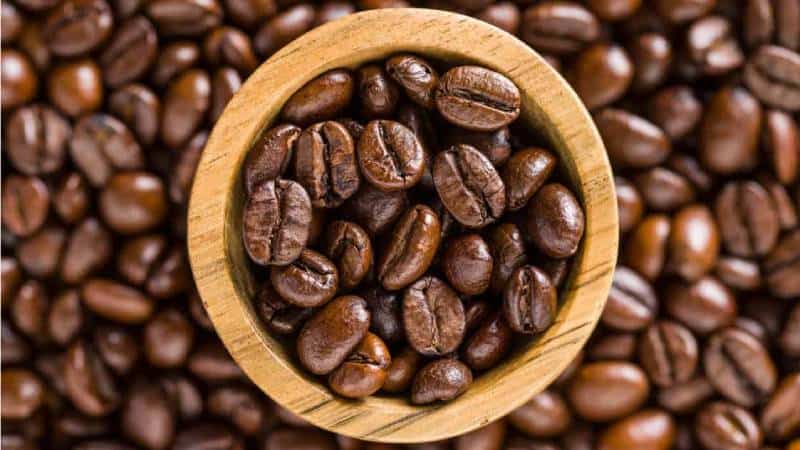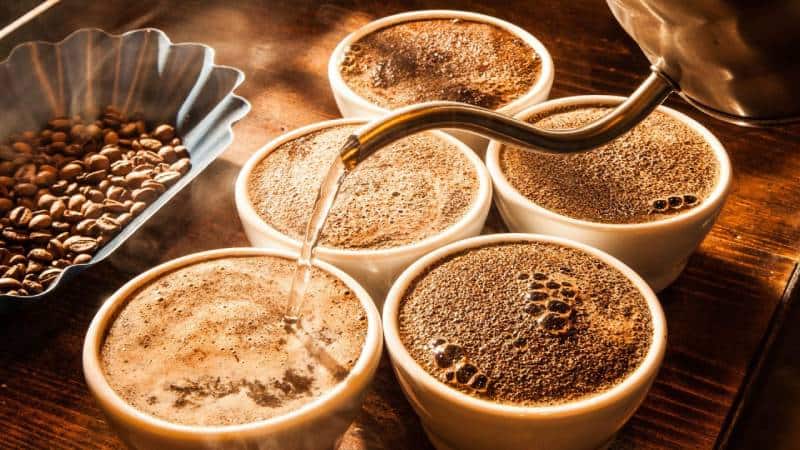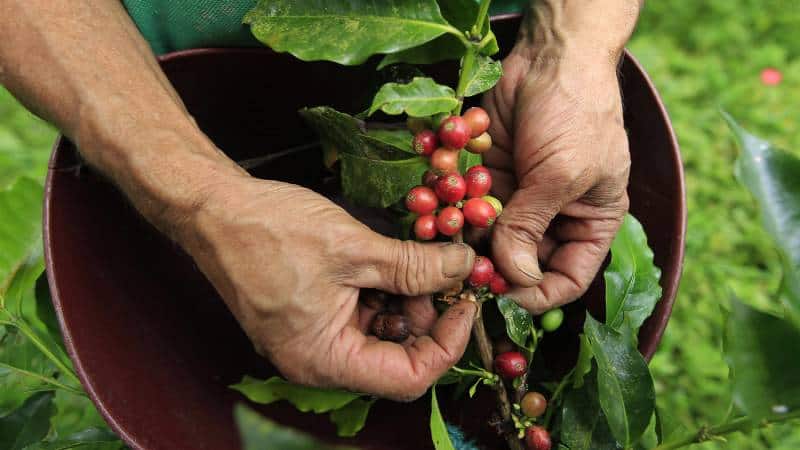The coffee that is most widely known as Colombian Coffee comes from the country of Colombia. This type of coffee has become popular in recent years because it is easy to find and tastes great. It has a delicious flavor that many people enjoy drinking daily, especially when they are looking for an energy boost to start their day.
See Also:
- 4 Criterias To Choose A Coffee Scale And How To Use It
- What Is A Frappuccino? – A Delicious Coffee With No Caffeine
What Is Colombian Coffee?
Colombian coffee is made from beans that are grown in Colombia. The most common variety of these beans is arabica, which provides a richer taste with more complex flavors than the cheaper robusta bean. The exact flavor profile will vary depending on the type of Colombian coffee and where it was grown.
Colombia is a global leader in the production of arabica coffee and the excellent flavor and aroma are highly sought after.
History Of Colombian Coffee
Let’s have a brief look at its history to see how it came to be such a force in the world of coffee.
Coffee was introduced to Colombia by Jesuit priests in the 18th century, and some thirty years later it was being exported from Colombian coffee beans to the United States. Thanks to favorable growing conditions, exports of Colombian coffee beans alone had reached 170,000 bags by 1860.
In 1927, the Federación Nacional de Cafeteros de Colombia was created to help regulate the coffee industry and promote its growth.
The Federación introduced Juan Valdez, a fictional coffee farmer. The farmworker helped raise the profile of Colombian beans around the world.
Coffee production in Colombia has continued to grow, even despite some challenges. It has now increased to the third-largest coffee producer in the world and is the largest arabica-bean grower.
What Makes Colombian Coffee Unique?
Colombian coffee is grown on small family-run farms, many of which are smaller than 12 acres. Roughly half a million families are working immensely hard to produce these beans for our consumption.
Colombian coffee is made with the same beans as other varieties, arabica. They’re less robust in flavor than others. The entire coffee industry in Colombia emphasizes quality and there are lots of crops to pick from.
What Does Colombian Coffee Taste Like?
Colombian coffee is a crowd-pleaser, featuring flavors of chocolate, caramel, and nuts.
You’ll find some similarities between Colombian and Brazilian coffees; however, there’s more acidity in Colombian coffee. Acidity is heralded as a sign of good quality coffee because it lends the drink much-loved vibrancy and refreshing qualities.
Most people think of the acidity in coffee and sourness as being the same thing. Acidity is what you enjoy from some fruits, such as apples or pineapples. Sourness is an unpleasant taste that comes from a fruit that has not ripened enough to be tasty by the time it’s eaten
Colombians are known for their nuanced coffee flavors, with a rich body and medium acidity that make the perfect espresso blends.
Espresso is a supersaturated brew of coffee, so any subtle intricacies will be amplified. Espresso can very well taste just as displeasing depending on the intricacy of flavors present; too many flavor nuances make it feel unbalanced.
There are many varieties of coffee in Colombia, ranging from mild and round to fruity and tangy.
Colombian coffees are popular for a reason; they provide something for everyone.
What Is Different About Colombian Coffee?
WHAT IS THE DIFFERENCE BETWEEN COLOMBIAN COFFEE AND REGULAR COFFEE?
Contrary to its name, Colombian coffee just means coffee that has been grown in Colombia.
Colombian coffee is often found in premium pre-packaged coffee in places like the supermarket because it is made with a more superior variety of arabica beans.
The confusion between Colombian coffee and other types of coffee arises due to the wording on packet labels. The words ‘100% Colombian Coffee’ used by the Federacion Nacional de Cafeteros (FNC) in Colombia is no more than a marketing ploy to stand apart as something special.
Whenever you see words such as ‘Morello cherries’, or ‘Italian lemons’ on a packet of food your mind instinctively knows that it is something special.
Are Morello cherries better than Italian lemons? Nope, it’s the same thing! Looks like marketing can work too.
Albeit its low yield, Colombian coffee remains popular throughout the world due to its genuine taste.
However, if you give the majority of people a cup of coffee from Brazil, Bolivia, or Guatemala, they would most likely be hard-pressed to tell the difference.

DOES COLOMBIAN COFFEE HAVE MORE CAFFEINE?
Colombian coffee has a caffeine content that is very similar to other beans.
Some myths are claiming that different roast types will affect the caffeine levels in your cup of Joe. The truth is, no matter if you have light or dark roasted Colombian coffee all of the blends will deliver almost the same caffeine level because they start similarly and don’t significantly change throughout the process.
A dark roast tends to have a bit more caffeine than a light roast. However, the difference is negligible and unlikely to be felt.
WHY IS COLOMBIAN COFFEE SO EXPENSIVE?
You might be wondering why Colombian coffee is so expensive, after all, it’s just beans ground into a fine powder and brewed in hot water to produce an aromatic brown liquid that we drink. The answer lies with your taste buds.
The flavor of Colombian coffee is strong and earthy, which means it’s not for everyone. The beans also take longer to roast than some types so the cost goes up because there are more steps involved in producing a cup. Luckily you can always find cheaper alternatives when your budget starts to feel tight.
IS COLOMBIAN COFFEE STRONGER THAN REGULAR COFFEE?
Colombian coffee can be a stronger brew than other types of non-Colombian coffee, but in general, it is typically weaker. Once you find a coffee maker that suits your lifestyle, experiment with lighter and darker roast beans to find an optimal strength for yourself. Thanks to the high-quality bean varieties utilized when Colombian coffee is brewed, strong concentrations
Brewing a stronger cup of coffee at home will generally require more grounds and less water and more sophisticated brewing methods. *Load up your “electric pour-over” (or standard coffee maker) with just enough grounds to fill the filter. A heaping pile may give you a different taste, but not one that is likely what you are
Where Can I Buy Colombian Coffee?
Colombian coffee is available from select retailers. Quality Popayan Supremo makes up the full flavor of Colombian coffee, but different types also await in various roast levels to satisfy your taste buds.
Some Other Related Questions
Why Colombian coffee is the best?
Since the early 1800s, Colombia has exported coffee. Coffee beans were initially used for energy in a region without access to artificial stimulants Colombia’s coffee is world-renowned for its distinctively rich flavor and the enticing aroma it gives off. It has been exported for over 200 years, making it our most traded good.
Is Colombian Coffee the best in the world?
Colombian coffee is renowned for its quality and delicious taste. Countries like Colombia are among the best in the world concerning their coffee production.
What is the most popular brand of coffee in Colombia?
The best Colombian coffee brands currently on the Market
– Don Pablo Colombian Supremo
– Volcanica Colombian Peaberry
– Coffee Bean Direct Colombian Supremo
– Juan Valdez
– Koffee Kult – Huila Coffee
– Fresh Roasted Coffee
– Eight o’Clock Coffee
– San Francisco Bay Coffee
Conclusion
Colombian coffee has an excellent reputation, and it lives up to the hype. Regardless of your current coffee-drinking habits, you’d probably enjoy a cup made from their unique beans that were grown there.

Felix Hendricks is a skilled barista with over 12 years of experience. He excels in crafting coffee and has a strong foundation in coffee machine mechanics. Felix holds a Coffee Machine Maintenance Certification from the Coffee Equipment Technical Institute, showcasing his ability to diagnose and repair coffee machines. He’s also worked as a quality control specialist, selecting premium coffee beans for optimal flavor. Felix has a diverse work history, including stints at renowned coffee spots like Café Euphoria & Starbucks. His expertise in both brewing and machine maintenance makes him a respected figure in the coffee industry.

